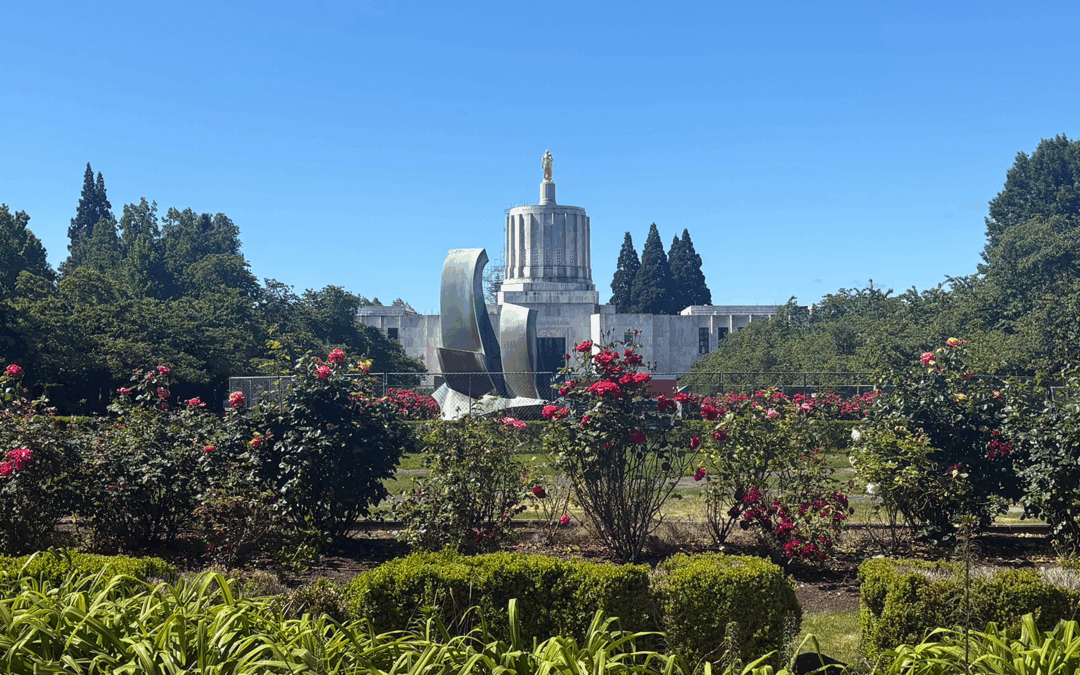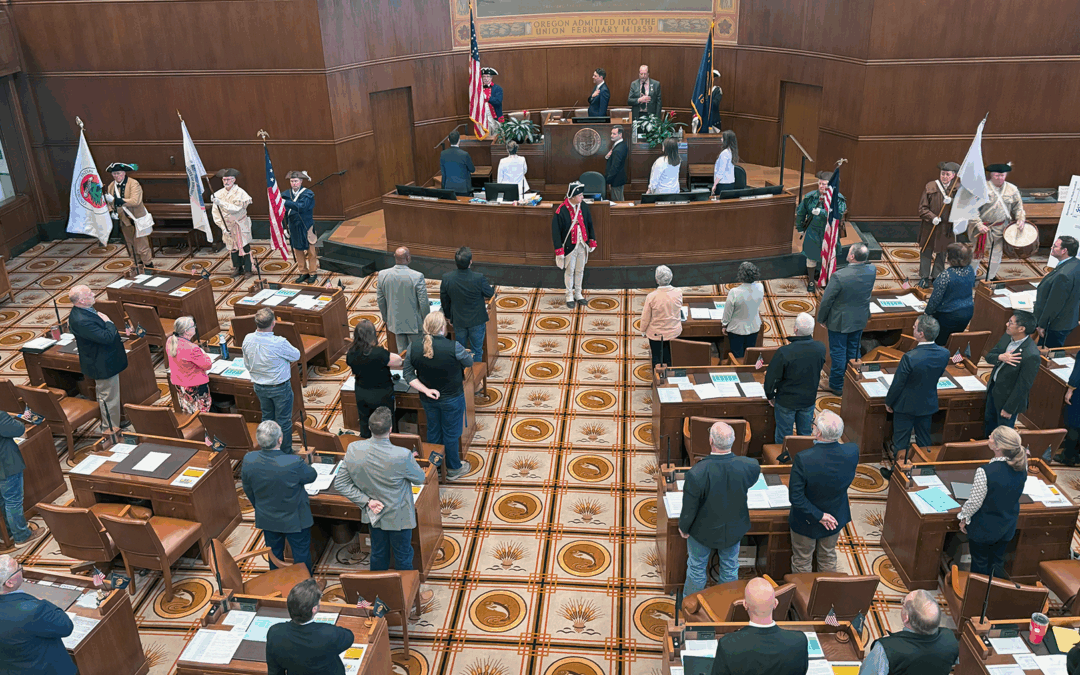
Jun 2, 2025 | AOC Advocacy
The “second chamber deadline” for the 2025 Legislative Session passed on Friday, May 23, at 5 p.m. Bills must have been voted out of the second chamber policy committee in order to continue moving through the legislative process toward becoming law. Nearly all of the Association of Oregon Counties’ (AOC) priority bills are advancing or are in committees not subject to this deadline. Most of the bills opposed by AOC have been amended to mitigate our concerns or will not move forward this session.
As the Legislature prepares its balanced biennial budget, policy bills with a fiscal component requiring state general fund allocations are sent to the Joint Committee on Ways and Means. If the budget writers intend to fund those policy bills, they will be referred to the appropriate subcommittee for further consideration before being heard in the full joint committee. Bills must pass both the House and Senate before the legislative assembly adjourns “sine die” – Latin for “without a day.” The presiding officers have identified Wednesday, June 18, as “target sine die,” and Sunday, June 29, is “constitutional sine die.”
Below are updates on AOC’s 2025 session priorities and bills on which we have been actively engaged. A comprehensive bill list is available on AOC’s Legislative Committee Website and is regularly updated throughout the session.
May Revenue Forecast
The latest revenue forecast was presented to the Legislature by state economists on Wednesday, May 14. As some expected, projected revenues available for the 2025-2027 biennium were revised downward from last quarter – due to a reduction in both revenue and resources – resulting in $755 million less than previously expected for the Legislature to allocate. However, the state’s kicker rebate has also been reduced to $1.6 billion providing a net General Fund balance of $35.7 billion. Paired with an additional $5.3 billion from lottery revenues, recreational marijuana excise tax, and Corporate Activity Tax, Oregon stands with just over $41 billion in total available funds, plus a 10.6% emergency reserve. Given Governor Kotek’s proposed 2025-2027 budget recommending $39.3 billion in funding, Oregon is in a reasonable position compared to our neighboring states to continue providing existing public services.
AOC 2025 Session Priorities Status Updates
Assessment and Taxation Funding
Ongoing conversations and negotiations with stakeholders and members of the House Committee on Revenue are taking place around AOC’s assessment and taxation funding proposal, House Bill 3518. AOC anticipates a final informational hearing in the House Committees on Revenue in the coming weeks and remains optimistic that a solution will move forward this session.
Community Corrections and Deflection Funding
The April corrections population forecast showed a substantial decline in the projected population for individuals on community supervision. This is both good and bad news. The baseline budget is substantially smaller, and the cost study is more affordable. However, because funding is allocated per person, it becomes even more critical to fully fund the study. Unfortunately, the Oregon Department of Corrections budget passed out of the Way and Means Subcommittee on Public Safety at the current service level amount, which is substantially lower than the governor’s request and does not incorporate any of the cost study.
AOC’s county deflection program cost survey yielded a statewide ask of $47 million, which is $7 million more than the governor’s recommended budget. The Criminal Justice Commission recently presented 2024 program results, current data as of April 2025, and evidence-backed best practices to the Ways and Means Subcommittee on Public Safety. AOC continues to be engaged with the budget writers, urging them to fully fund these integral public safety measures.
Health and Human Services
AOC is advocating for funding to meet counties’ statutory obligations for behavioral health, public health, and intellectual and developmental disabilities services; adequate statewide funding for effective deflection programs; and maintenance of homelessness response infrastructure and local coordination.
Senate Bill 610A, which improves transparency and coordination of Behavioral Health Resource Network grantmaking with the local behavioral health system passed out of the House this past Thursday and is on its way to be signed by the governor.
AOC’s remaining public health priorities including funding for Community Mental Health Programs, Oregon Health Authority residential treatment study, expanded substance use disorder prevention and treatment capacity, and local healthcare workforce development await action in Ways and Means.
State Forest Harvest Revenue
House Bill 3103A would require a sustainable harvest in the state forests, which in turn will provide a level of budgetary certainty for the 15 Trust Land Counties. The bill was moved to Joint Ways and Means for fiscal consideration following the May revenue forecast. Oregon Forest Industries Council, Special Districts Association of Oregon, Oregon School Boards Association, Coalition of Oregon School Administrators, and the Oregon Education Association have all leaned in to support this measure and urge its passage.
Transient Lodging Tax Flexibility
House Bill 3962-2 extends the permissible uses of net revenue from a new or increased local transient lodging tax to include public safety services and certain costs related to community infrastructure. HB 3962-2 received a hearing in the House Committee on Revenue on May 8, and remains active. AOC continues to provide support to legislators through ongoing negotiations.
Transportation Funding Package
Hearings on the 2025 transportation package moved to the newly created Joint Committee on Transportation Reinvestment. Membership of the committee is the same as the regular Joint Committee on Transportation, but it is not subject to deadlines, meaning a final package can be introduced, debated, and moved out of the committee up to the final days of session.
As this conversation and negotiation evolves, AOC staff will continue to advocate for the principles and priorities set by our Legislative Committee.
Tyler v. Hennepin Foreclosure Surplus Alignment
House Bill 2089 provides for a process by which former owners of real property deeded to the county for delinquent property taxes may claim the surplus value after the property has been sold by the county. This brings Oregon into alignment with the U.S. Supreme Court’s decision in Tyler v. Hennepin County. AOC has been negotiating on this issue since early 2024 to mitigate many of the operational and financial burdens that the Supreme Court decision and early versions of HB 2089 would have created. A work session has been scheduled for Tuesday, June 3, to consider a final negotiated amendment.
Water
All of AOC’s priority water bills, including place-based water planning, were referred to the Joint Committee on Ways and Means for further consideration.
Wildfire
After successfully passing through its first policy committee, House Bill 3940, one of the Wildfire Funding Workgroup bills, was heard in May in the House Committee on Revenue. The AOC Legislative Committee voted to support Sec. 6-44 (programmatic changes that will save public and private landowners money going forward) at the May meeting. With AOC now officially in support, there will be greater leverage in negotiations as all members of the workgroup are united in ensuring there is fair and consistent funding to fight wildfires in Oregon.
Wolf Depredation Grants
Senate Bill 777A makes a series of changes to the Wolf Depredation and Compensation Grant Program housed at the Oregon Department of Agriculture – a longtime priority of AOC. Counties took the lead on the wolf depredation legislative concept, which will help bring additional deterrence to the landscape and more ranchers into the program. After over a decade of failed attempts at updates to the program, SB 777 passed out of the Senate with a strong 28-1 floor vote. The bill unanimously passed out of the House Agriculture Committee and is slated for a House floor vote the first week of June.

May 1, 2025 | AOC Advocacy, AOC News
The Association of Oregon Counties (AOC) Legislative Affairs Department had a productive month advocating for AOC’s priority bills. Most of the bills supported by AOC advanced through the first chamber deadline in April, while several bills opposed by AOC have been amended to mitigate our concerns or will not move forward this session.
Adding to a strong month of engagement, AOC members joined legislators on the Senate floor on April 14 to receive courtesies of the Senate. Senator David Brock Smith, a former Curry County commissioner, highlighted the wide range of public services that Oregon counties deliver to all Oregonians. This event took place amid a particularly intense legislative session. A record 3,400+ bills were introduced this session. After an oftentimes chaotic and reactive 12-week sprint, and only about half of those bills survived the first chamber deadline and the potential to move forward this session.
About 500 budget bills and policy bills with a funding component await action in the Joint Committee on Ways and Means. Following the May 14 revenue forecast, legislative budget writers will start to narrow that universe significantly, making difficult decisions about how to allocate the state’s general fund. The second chamber work session is just around the corner — policy bills must be posted for a work session in the second chamber policy committee by May 9, or they will not be able to move forward this session.
Below are updates on AOC’s 2025 session top policy and budget priorities. A comprehensive bill list is available on AOC’s Legislative Committee webpage and is regularly updated throughout the session.
Assessment and Taxation Funding
Conversations and negotiations around House Bill 3518, AOC’s Assessment and Taxation Funding proposal with members of the House Committee on Revenue and stakeholders are ongoing – an amendment is expected soon. The Senate Committee on Finance and Revenue held an informational meeting on county assessment and taxation last week and the presentation garnered productive conversation with the committee. AOC remains optimistic that a solution for this long-time priority issue will move forward this session.
Community Corrections Funding
The April corrections population forecast showed a substantial decline in the projected population for individuals on community supervision. This is both good and bad news. The baseline budget is substantially smaller, and the cost study is more affordable. However, because funding is allocated per person, it becomes even more critical to fully fund the study. AOC continues to be engaged with the co-chairs of the Ways and Means Public Safety subcommittee and have received positive feedback about fully funding the cost study.
Health and Human Services
AOC is advocating for funding to meet counties’ statutory obligations for behavioral health, public health, and intellectual and developmental disabilities services; adequate statewide funding for effective deflection programs; and maintenance of homelessness response infrastructure and local coordination.
The following AOC priority bills have been referred to the Joint Committee on Ways and Means with “do pass” recommendations:
- House Bill 2056 allocates $64.8 million to Community Mental Health Programs to ensure they can deliver the critical crisis intervention, civil commitment, and aid and assist services required by law.
- House Bill 2015, requiring OHA to study and report on ways to make residential treatment facilities operations more sustainable;
- House Bill 2059, allocates $90 million to continue to build residential addiction treatment capacity; and
- House Bill 3916, allocating $5 million for local health workforce development – also moved out of policy committees to the Joint Committee on Ways and Means with do pass recommendations.
AOC’s county deflection program cost survey yielded a statewide projection of $47 million base funding needed for both counties and tribes, which is $7 million more than the governor’s recommended budget. Bills to further refine Ballot Measure 110-related programs, including improved transparency and coordination of Behavioral Health Resource Network grantmaking with the local behavioral health system, are being negotiated by legislative leadership. The suite of civil commitment reform bills under consideration were moved to the Joint Committee on Addiction and Community Safety Response for ongoing negotiation apart from the chamber deadlines.
State Forest Harvest Revenue
The Council of Forest Trust Land Counties testified in strong support of House Bill 3103 at its public hearing earlier this month. This bill would require a sustainable harvest in the state forests, providing a level of certainty to the trust land counties that rely on these harvest revenues. HB 3103 was moved to the Joint Committee on Ways and Means with unanimous support.
Transportation Funding Package
The co-chairs of the Joint Committee on Transportation released the much-anticipated transportation package framework last week, now known as the Oregon Transportation ReInvestment Package (TRIP). The initial framework includes increases to existing funding mechanisms and several new mechanisms. Total projected funding from the proposal equates to a 70% increase to counties over current projected revenues. AOC staff will continue to advocate for the principles and priorities set by our Legislative Committee in negotiations on a final package.
Water
All of AOC’s priority water bills, including place-based water planning, were referred to the Joint Committee on Ways and Means for further consideration.
Wildfire
A series of bills have been introduced based on Wildfire Funding Workgroup recommendations: HB 3940, HB 3947, SJR 11, SB 1177, and SB 1132. All of the bills moved to committees not subject to the first chamber deadline without recommendation for further discussion and negotiation.
Wolf Depredation Grants
Senate Bill 777 A makes updates to the Wolf Depredation and Compensation Grant Program housed at the Oregon Department of Agriculture – a longtime priority of AOC. Counties took the lead on the wolf depredation legislative concept, which will help bring additional deterrence to the landscape and more ranchers into the program. After over a decade of failed attempts at updates to the program, SB 777 passed out of the Senate 28-1 and had a positive public hearing yesterday in the House Committee on Agriculture, Land Use, Natural Resources, and Water.

Apr 30, 2025 | AOC Advocacy, AOC News, Transportation
The Co-Chairs of the Joint Committee on Transportation recently released a framework for the 2025 Transportation ReInvestment Package (TRIP). New revenue proposed in the framework equates to a 70% increase in statewide county road department funding over current projections. According to the 2024 County Road Needs Study, counties statewide face a $834 million/year funding shortfall – the TRIP framework makes significant progress toward filling that gap.
The TRIP framework aligns with the Association of Oregon Counties (AOC) Legislative Committee’s transportation priority by maintaining the 30% county share and modernizing State Highway Fund (SHF) revenue mechanisms. The framework also directs 90% of all new revenue to safety, maintenance, and preservation across the shared transportation system.
“Advocacy from counties will be critical to maintaining these proposed investments and the county 30% share of the SHF in the final package,” urged Legislative Affairs Director Mallorie Roberts.
While bill language is expected to be released by early May, with public hearings in the Joint Committee on Transportation to follow, negotiations among legislators are already underway. AOC has prepared talking points (linked below) based on AOC’s transportation package priority and principles which can be used as a starting point to engage with the Legislature and the media.
AOC appreciates your advocacy and engagement in this top priority issue for AOC and counties. Please copy AOC Legislative Affairs Director Mallorie Roberts on emails to legislators, and if you have any questions please don’t hesitate to reach out.
Resources

Mar 31, 2025 | AOC Advocacy
Friday, March 21, marked the first major legislative deadline this session, known as the “first chamber posting deadline.” Any bills not posted for a work session in their first policy committee by the deadline will not move forward this session. It is important to note that not all bills that have been posted for a work session will actually move forward through the process. Committee chairs often post bills to keep them “alive” and amendable until the first chamber work session deadline on April 9, after which any bill that has not moved out of its first chamber policy committee cannot move forward this session.
The Association of Oregon Counties’ (AOC) priority bills are almost all moving forward through this deadline, while several bills that AOC opposed will not.
Legislative Affairs Director Mallorie Roberts expressed gratitude to all members and county staff that have responded to AOC’s Action Alerts so far this session. “Public hearing engagement and legislator outreach from individual counties, commissioners, judges, and chairs has a significant impact on AOC’s advocacy efforts,” Roberts said.
Many work sessions will be canceled over the next two weeks. An important caveat – several committees are not subject to the first session deadline – Senate and House Rules, Senate and House Revenue, Ways and Means, and other joint committees, including the Joint Committee on Transportation and the Joint Committee on Addiction and Community Safety Response. Bills in these committees are alive until the second chamber posting and work session deadlines in May.
AOC reviews all introduced legislation and amendments for an impact to county services, budgets, and governance. As always, your AOC Legislative Affairs Department relies on AOC’s adopted principles, member input in our policy process, strategy conversations with steering committee co-chairs, and consultation with county staff subject matter experts to analyze legislation and inform our advocacy.
A comprehensive status update on AOC’s 2025 session priorities and bills on which we have been actively engaged so far this session can be viewed here. A bill list is available on AOC’s Legislative Committee Website and is regularly updated throughout the legislative session.
Contributed by: Mallorie Roberts | Legislative Affairs Director

Mar 31, 2025 | AOC Advocacy, Natural Resources
Senate Bill 777, introduced this legislative session to change the methodology used to determine wolf attack loss grants, easily passed the Senate on Tuesday, March 25, and now heads to the House for consideration.
The bill removes the “missing” category from the types of depredations eligible for compensation and places a multiplier on depredation that occurs based on the type of animal impacted and the recommendation of the county advisory committee. It also increases the amount of grant program funds that must be put toward non-lethal deterrents from 30% to 50%.
Although similar bills have been introduced in prior sessions, the Association of Oregon Counties took the lead this session in working with the Oregon Cattleman’s Association and impacted Oregon counties and provided testimony on the program to articulate why, from an administrative standpoint, the bill was necessary. Although many ranchers in south-central and eastern Oregon participate in the program, there are some counties that see less than 10% of their entire ranching population participate. The changes from SB 777 are expected to encourage more participation in the program, ensuring that more deterrents are on the landscape and that ranchers will be justly compensated.
The Wolf Depredation Compensation and Financial Assistance Grant Program was established as a complementary and necessary program for the full implementation of Oregon’s Wolf Plan, when the Legislature unanimously passed House Bill 3560 in 2011. HB 3560 stipulated grant money would be made available to assist counties in compensating those who suffer loss, injury, or missing livestock due to the presence of wolves in their area. The bill also allocated financial assistance to counties that implement livestock management or nonlethal wolf control techniques. These methods could include, but are not limited to, range riders, spotlighting, pasture monitoring, fox lights, air cannons, non-lethal projectiles, carcass removal and drones with thermal optics, to name a few. HB 3560 also required counties to allocate a minimum of 30% of the funds they request to livestock management or nonlethal deterrents.
To participate in the program, counties were required to establish a county wolf depredation committee. The makeup of a county committee, per ORS 610.150, includes one sitting county commissioner, two livestock owners, two wolf conservationists, and two members of the business community (agreed upon by the other members). In 2012, only eight counties were eligible for funding; however today 18 of Oregon’s 36 counties have established wolf depredation committees.
With the Senate vote of SB 777, this is the first major change to the wolf depredation program in over 10 years.
Contributed by: Branden Pursinger | Legislative Affairs Manager

Mar 25, 2025 | AOC Advocacy
The Joint Committee on Ways and Means kicked off their 2025 community budget hearing meetings on Saturday, March 22, in Gresham. Legislators are travelling around the state to hear from community members about what programs should be prioritized this budget cycle. The Association of Oregon Counties (AOC) encourages members to sign up and testify about your community needs and AOC’s top priority budget items this session. Below are talking points on AOC’s 2025 budget priorities and the committee hearing schedule.
JOINT COMMITTEE ON WAYS AND MEANS ROADSHOW SCHEDULE
Warm Springs
Friday, April 4, 5-7 p.m.
Old Warm Springs Elementary School
Members of the public can register to testify here
La Grande
Friday, April 11, 5-7 p.m.
Eastern Oregon University, Hoke Union Building #339
Members of the public can register to testify here
Salem, Statewide Virtual Testimony Prioritized
Wednesday, April 16, 5-7 p.m.
Oregon State Capitol Building, Hearing Room F
Members of the public can register to testify here
Klamath Falls
Friday, April 25, 5-7 p.m.
Klamath Community College, Building 4 Commons
Members of the public can register to testify here
AOC 2025 BUDGET PRIORITIES TALKING POINTS






